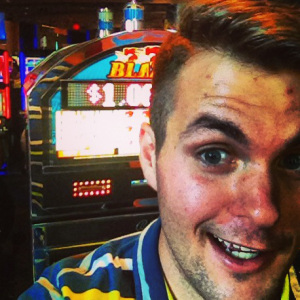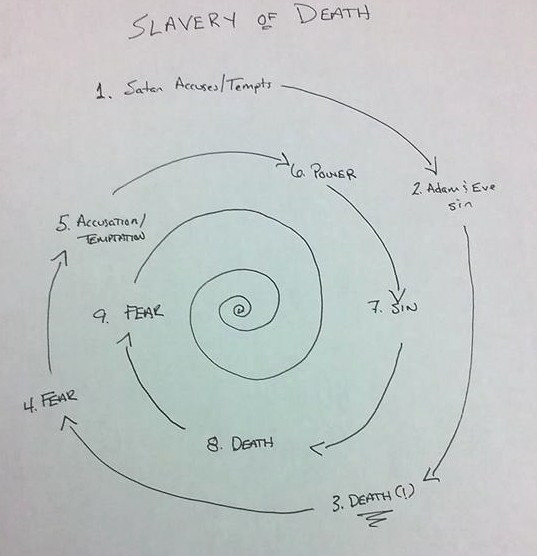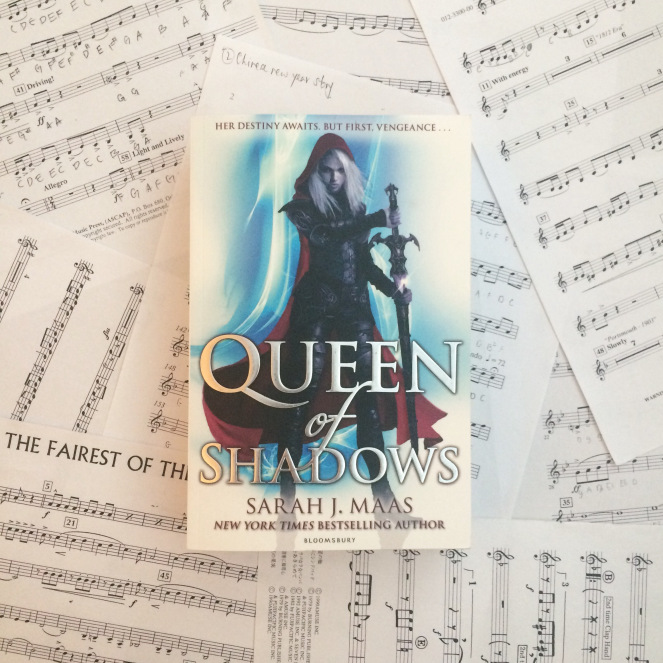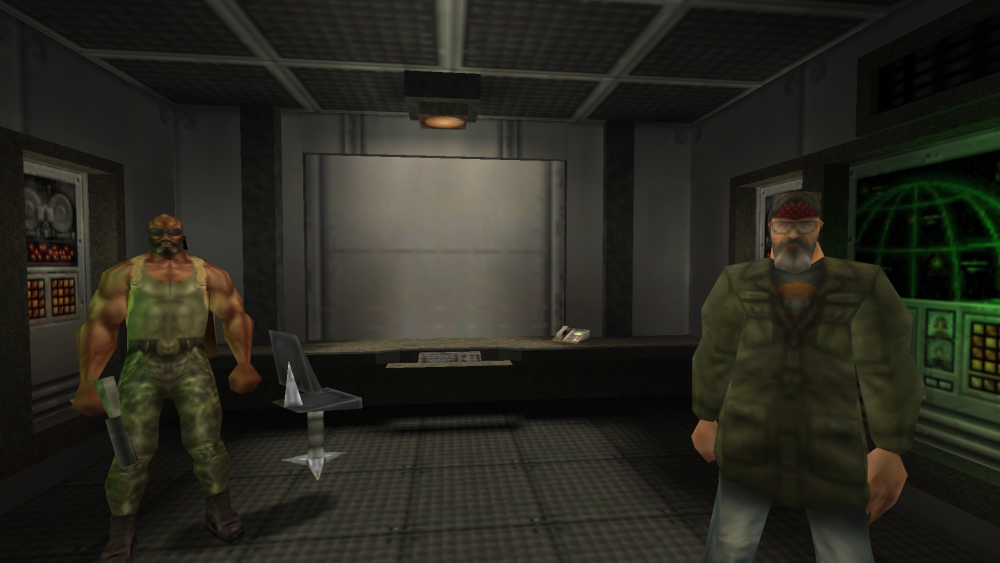Husker Du (left to right: Bob Mould, Grant Hart, Greg Norton) at the Zen Arcade album cover shoot. Photo by Mark Peterson.
by Rick Ouellette
Of all the bands associated with the American hardcore wave of the late Seventies and early Eighties, few if any progressed further past its original stylistic margins than Husker Du. The trio of Bob Mould, Greg Norton and the late Grant Hart hailed from Minnesota’s Twin Cities area, far from hardcore hotspots like Los Angeles and Boston. While this wintry outpost would soon become the breeding ground of groups like the Replacements and Soul Asylum, this initial separation from the bicoastal centers of hip likely helped Husker Du forge its unique persona. They were informed by past rock history (cribbed from an old board game, their moniker in Swedish or Danish meant “do you remember?”) and upset with the diminished aspirations of Reagan-era Middle America. Depending less on the free-floating anger and standard-issue rebellion of their fast-and-furious compatriots, the Huskers’ had an earnest streak clearly discernible amid the unrelenting instrumental attack. Their initial recordings (made for the independent L.A. label SST) mirrored the early orthodox hardcore sound but both Mould and Hart quickly developed into talented and bountiful songwriters and in the summer of 1984 they unleashed this remarkable double album on the unsuspecting indie world.
What’s notable about the release of Zen Arcade was not just that it was a twin LP (unheard of in the land of one-minute songs) but in a sense it was Husker Du’s first proper studio album. Their debut, the aptly named Land Speed Record, was recorded live while the equally mosh-happy follow-up, Everything Falls Apart, lasted only nineteen minutes despite accommodating twelve songs. That in turn was succeeded by the EP Metal Circus and by the time that hit whatever record stores would have it in October of ’83, the guys were already headed for a Redondo Beach studio to record again with SST house producer Spot. During the summer the group had hashed together a couple of dozen songs while rehearsing in an abandoned church in St. Paul and their collective creative wave was cresting. Adding a variety of musical approaches to the blistering aesthetic they had already mastered, Husker Du came away with a groundbreaking 23-song collection that was hailed as a sort of punk Quadrophenia and paved the way for the imperishable phenomenon now known under the umbrella term “alternative rock”.
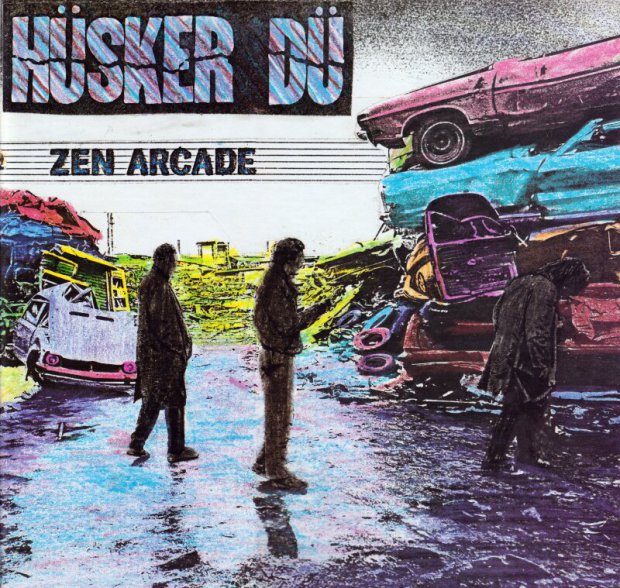
This musical branching out, a feature of so many double albums through the years, would not mean a retreat from the central hardcore theme of disaffected youth. On the album’s front cover, below the title with its contrasting hints of enlightenment and distraction, is a picture of the silhouetted band wandering among stacks of crushed cars in a hand-colored junkyard. This symbol of disposable American culture is reflected in the Zen Arcade’s ostensible storyline of a troubled young man who, alienated from his parents and hometown connections, heads off to make his way in an indifferent world. The inspiration may have primarily rose from Mould’s formative experience in an unhappy home while coming to terms with his sexuality (both he and Grant Hart are gay). “Something I Learned Today” opens the record with unmistakable urgency as Hart’s hard-charging drums are quickly coupled to Greg Norton’s matching bass line while Bob Mould’s signature sheets of distorted guitar chords gets layered on top. Mould jumps into the first verse already in high dudgeon, railing in the first-person voice of a kid who’s decided early on to distrust a society that asks him to “yield to the right of way” for rule makers who never make themselves known. Two songs later, in Hart’s acoustic guitar-led “Never Talking to You Again,” the nameless narrator is bidding a rueful goodbye to a family he never properly connected with. A sense of aimless searching follows (in “Chartered Trips” a stint in the army is implied) and true to the band’s past, most of the songs in the album’s first half unfold in a maelstrom of raging vocals and harsh power trio attacks.
All this may prove a bit rough on the ears for those newbies intrigued by an LP that even on its initial release was praised by influential publications like the New Musical Express and the Village Voice, and considered for a place on the mantle adjacent to Exile on Main St. and London Calling. Two-minute blasts with titles like “Indecision Time,” “Broken Home, Broken Heart” and “The Biggest Lie” are fair indicators of Zen Arcade’s occluded psychological landscape and are not universally accessible. A couple of Grant Hart compositions near the end of the old side two, both intense internal dialogues, do point to the band’s growth process and preview the greater heights to follow on the second disc. “What’s Going On,” taken at a vigorous but manageable pace, is the kind of alt-rock easily loved by both suburban skate punks and arty college students, especially with Mould’s torrid lead guitar coda. The more reflective “Standing by the Sea” is anchored by Norton’s urgent, pulsating bass figure, a good example of his often-overlooked contribution to the group’s sound.
Side three kicks off with a six-minute triptych that distilled the qualities of the new Husker Du to its finest essence, a pair of astute two and a half minute rockers separated by a contemplative piano interlude. From Mould’s fuzzy, staccato opening riff to Hart’s last shouted refrain, “Somewhere” perfectly encapsulates, both musically and lyrically, the formless but oddly existential despair of the Gen X diaspora. “Looking down on everything it seems a total bore/Missing all the people that I’ve never met before/Trying to find an unknown something I consider best/I don’t know if I’ll find it, but until then I’ll be depressed”. The echoey abeyance of “One Step at a Time” follows but is quickly overtaken by the ominous chord progression of “Pink Turns to Blue,” a poignant tale of an overdosed young woman that may be the best dead-girlfriend song since “Paint it Black,” if that exists as a category. The pro-forma rage of early hardcore is swept aside with articulate imagery (“Angels pacing, gently placing roses ‘round her head”), a splintering multi-tracked guitar solo and a ghostly chorus sung in near falsetto. The group’s progression into masterful purveyors of noise pop carried forward from here.
Such changes would invariably alienate the band from some in their original constituency, but all but the most obtuse hardcore loyalists were soon converted. The band plows ahead with “Newest Industry,” lashing out at Cold War mentalities in their darkest days (“A world where science went too far, there’s no way to survive/Why can’t we get this thing straightened out, I want to stay alive”) but finding room for post-apocalyptic gallows humor as well (“Now we live in caves and huts and we don’t have pay TV”). Continuing a quartet of Mould compositions that close out side three, the focus quickly turns inward with another lovely piano interlude (“Mondays Will Never be the Same”), a regretful cry in the wilderness directed back at the parents left behind on side one (“Whatever”) and “The Tooth Fairy and the Princess,” the best of the album’s occasional side trips into punkish psychedelia, a tape-manipulated dreamscape of chanting self-encouragement.
The studio FX crop up again at the start of side four (radio static and interrupted talk-show voices, the electronic clutter of a cross-wired world) before Mould’s monstrous power chord and the advancing column of a rhythm section announce “Turn on the News.” This Grant Hart-penned cri de Coeur is Zen Arcade’s last track with vocals and probably its most acclaimed song. If a rock opera it be, then our troubled young narrator has returned from the doldrums to sing his big number from a balcony. “If there’s a thing that I can’t explain/Is why the world has to have so much pain,” he begins, then delivers a compact catalogue of earthly ills, concluding—simply and profoundly—“all this uptight pushing and shoving/keeps us away from who we should be loving.” It’s so sonically powerful that even the incongruous elements, the handclaps and the Skynrd-like guitar climax, add to its mighty impact.
But just after being encouraged to wake up and stake a place against all the odds, the listener is hurled into the sturm and drang of “Reoccurring Dreams,” the 14-minute instrumental conclusion. This towering (if unnerving) piece, done like most of the other tracks in a single take, runs through several cycles of emotional peak and valley, as if through life itself. The frenzied eight-note motif builds and yields to suspended episodes of Mould’s needling guitar and Norton’s percolating bass, before Hart’s lightning drum fills takes it up again until the end game, with a piercing, extended single note that Hart likened to a flatlining EKG machine.
A powerful and poignant clip of Grant Hart performing a solo “I’m Never Talking to You Again” just four months before his death in September of 2017.
At the time of Zen Arcade’s release, Husker Du had been struggling to make a name for themselves by working a sort of punk version of the old chitlin’ circuit. This generally involved driving a semi-reliable van between gigs at slapdash venues, working with small-time promoters, using photocopied handbills for advertising and relying on fanzines for publicity in a pre-Internet age. To go from that to having your latest record considered alongside the likes of Highway 61 Revisited (as writer Mikal Gilmore did) was an early inkling that the band was outgrowing the quirks and limited resources of a homegrown label. Firstly, the album’s release was held up so that SST could put it out alongside the Minutemen’s Double Nickels on the Dime, the double album that was directly inspired by their labelmate’s opus. Moreover, SST only did an initial print run of a few thousand copies for Zen Arcade, stunting its momentum to the point that Rolling Stones’ glowing review of ZA didn’t appear until February of ’85, a month after the release of the Huskers’ excellent follow-up, New Day Rising.
Hung up in a no-man’s land between the underground and mainstream success, Husker Du’s real undoing would result from personal acrimony and substance abuse issues. From January ’85 to January ’87, they released four exemplary LPs (the last two for Warner Bros.), and their swan song (Warehouse: Songs and Stories) was also a double album. Prolific as they were, Grant Hart and Bob Mould became warring factions unto themselves, leaving poor Greg Norton caught in the middle. After all the battles over who would have how many songs per album, and the recriminations over creative differences and drug habits, Husker Du would stand tall as indie heroes in retrospect. This is especially true after alternative rock and grunge took flight in the Nineties while Hart soldiered on with Nova Mob and Mould with Sugar and as a solo artist. Zen Arcade rightfully took its place as a landmark album and, in an age of global political retrenchment, income inequality and the disconnected “connectedness” of a frazzled digital dictate, its rage against the dying of the light of youthful promise seems more pertinent and powerful than ever.
This Zen Arcade piano interlude will help clear the aural palette.
In this new series, I’ll take a in-depth look at a classic (or not so classic) double album every 10-14 days.
Next up: Pink Floyd’s Ummagumma, their half-live/half-studio opus from 1969.
